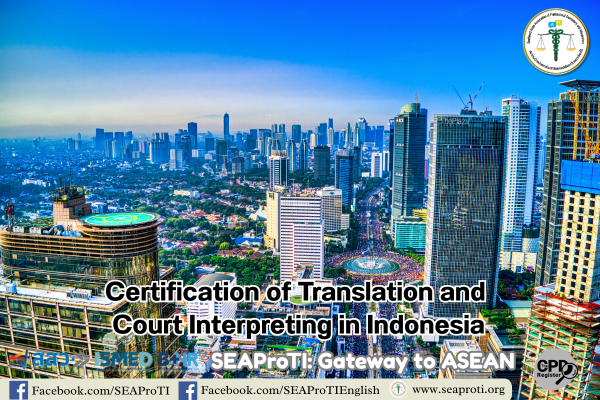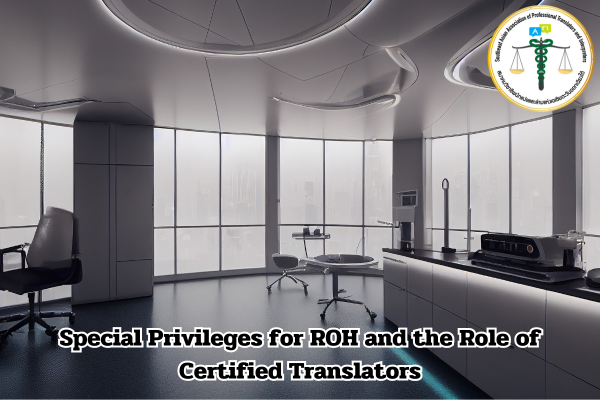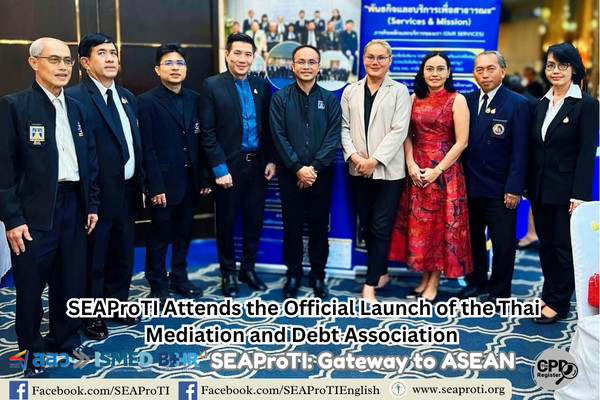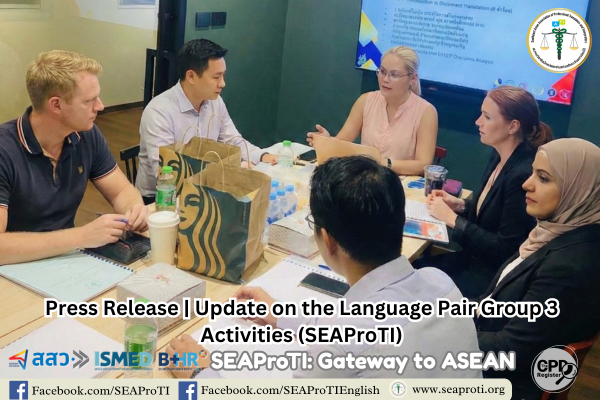Certification of Translation and Court Interpreting in Indonesia
13 October 2025, Bangkok – This article examines the certification system for translators and court interpreters in Indonesia, analyzing the legal framework, institutional structure, and qualification mechanisms under state supervision. The Indonesian model demonstrates an integration between legal authorities, higher education institutions, and professional organizations—particularly through the “Sworn Translator” (Penerjemah Tersumpah) qualification, which grants legal recognition to certified translators in official and judicial contexts. However, while the translator certification system is well established, Indonesia lacks a nationwide certification framework for court interpreters, relying instead on local appointment and practical expertise.
1. Introduction
The certification of translators and interpreters plays a vital role in safeguarding linguistic rights and ensuring fairness in judicial proceedings. Translation and interpreting in court settings require high linguistic precision and legal accuracy, as they directly affect the rights of parties and the integrity of the justice system (Hale, 2015). Indonesia stands out among Southeast Asian countries for developing a state-sanctioned certification framework for translators, who are legally recognized after passing a professional examination and taking an official oath as “Sworn Translators.”
2. Legal Framework and Regulatory Authorities
The certification of translators in Indonesia is governed by the Ministry of Law and Human Rights (Kementerian Hukum dan Hak Asasi Manusia — Kemenkumham) through Regulation No. 4 of 2019 on the appointment, reporting, and dismissal of sworn translators (Peraturan Menteri Hukum dan Hak Asasi Manusia Republik Indonesia Nomor 4 Tahun 2019) (Kemenkumham, 2019).
Under this regulation, a candidate must:
- Pass a qualification examination administered by the Badan Nasional Sertifikasi Profesi (BNSP) or National Agency for Professional Certification,
- Take an oath before a provincial governor or other authorized official, and
- Report to the Ministry of Law and Human Rights for registration as an official sworn translator (Vokasi UI, 2021).
This process formalizes the legal standing of translators who meet the required professional and ethical standards to work with government agencies and judicial institutions.
3. Examination and Oath Procedure for Sworn Translators
The University of Indonesia (Universitas Indonesia), through its Lembaga Sertifikasi Profesi (LSP UI), is authorized by the Ministry of Law and Human Rights to conduct the sworn translator qualification examination (Vokasi UI, 2021). Successful candidates must then take an oath (taking the oath) before a provincial authority to be registered as official sworn translators within Kemenkumham’s database (PEMAD Indonesia, 2023).
This model resembles those in certain European jurisdictions, such as France and Germany, where translators are sworn in before a court or judicial authority (Hertog, 2021). However, in Indonesia, the oversight resides within a ministerial rather than a judicial framework.
4. Legal Status and Scope of Work
Sworn translators in Indonesia have the legal authority to translate official documents, including birth and marriage certificates, contracts, court decisions, and immigration documents (PEMAD Indonesia, 2023; Translayte, 2024). Translations produced by sworn translators carry legal validity equivalent to the original documents when submitted to courts or administrative agencies.
By contrast, translations by non-certified individuals may be rejected by authorities, underscoring the professional and legal significance of the certification system. The framework thereby reinforces accountability, traceability, and public trust in translation as a legal instrument.
5. Court Interpreting in the Indonesian Context
Unlike sworn translators, court interpreters (juru bahasa pengadilan) in Indonesia are not subject to a unified national certification system. Court interpreters are typically appointed on an ad hoc basis by local courts, depending on linguistic proficiency and relevant experience (Kemenkumham, 2019). While some universities and private organizations provide legal interpreting training, no centralized body officially licenses or certifies court interpreters.
This fragmented approach may result in inconsistent quality across regions, posing potential challenges to equal access to justice—especially in a multilingual nation like Indonesia, where defendants and witnesses may use various regional or foreign languages (Heryanto, 2022).
6. Comparative Analysis and Policy Implications
Indonesia’s sworn translator certification framework exemplifies an effective collaboration between state authority and professional institutions. Nevertheless, the absence of a formalized national court interpreter certification system remains a critical gap. Establishing a Court Interpreter Accreditation System, modeled after international standards such as NAATI (Australia) or NRPSI (United Kingdom), could enhance the quality and reliability of courtroom communication and reinforce procedural fairness.
7. Conclusion
Indonesia’s current translation certification system provides a robust legal foundation for sworn translators through examination, oath-taking, and ministerial registration. However, the development of an equivalent accreditation framework for court interpreters is necessary to ensure linguistic equity and uphold the principles of justice for all language users in the Indonesian judiciary.
References
- Hale, S. (2015). Community interpreting. Palgrave Macmillan.
- Heryanto, A. (2022). Language, law, and power in Indonesian courts. Yogyakarta: Gadjah Mada University Press.
- Hertog, E. (2021). Legal interpreting and translation in Europe: The quest for professionalisation. InTRAlinea.
- Kementerian Hukum dan Hak Asasi Manusia Republik Indonesia. (2019). Peraturan Menteri Hukum dan Hak Asasi Manusia Nomor 4 Tahun 2019 tentang Tata Cara Pengangkatan, Pelaporan, dan Pemberhentian Penerjemah Tersumpah. Jakarta: Kemenkumham RI.
- PEMAD Indonesia. (2023). All about sworn translators. Retrieved from https://pemad.or.id/all-about-sworn-translator/
- Translayte. (2024). Certified translations in Indonesia. Retrieved from https://translayte.com/certified-translations/indonesia
- Vokasi Universitas Indonesia (UI). (2021). LSP UI mandated by the Indonesian Ministry of Law and Human Rights to hold sworn translator certification. Retrieved from https://vokasi.ui.ac.id/web/en/lsp-ui-mandated-by-the-indonesian-ministry-of-law-and-human-rights-to-held-sworn-translator-certification/
About Certified Translators, Translation Certifiers, and Certified Interpreters of SEAProTI
The Southeast Asian Association of Professional Translators and Interpreters (SEAProTI) has formally announced the qualifications and requirements for registration of Certified Translators, Translation Certification Providers, and Certified Interpreters in Sections 9 and 10 of the Royal Gazette, published by the Secretariat of the Cabinet, Office of the Prime Minister of Thailand, on 25 July 2024 (Vol. 141, Part 66 Ng, p. 100). Certified Translators, Translation Certification Providers, and Certified Interpreters
The Council of State has proposed the enactment of a Royal Decree, granting registered translators and recognized translation certifiers from professional associations or accredited language institutions the authority to provide legally valid translation certification (Letter to SEAProTI dated April 28, 2025)
SEAProTI is the first professional association in Thailand and Southeast Asia to implement a comprehensive certification system for translators, certifiers, and interpreters.
Head Office: Baan Ratchakru Building, No. 33, Room 402, Soi Phahonyothin 5, Phahonyothin Road, Phaya Thai District, Bangkok 10400, Thailand
Email: hello@seaproti.com | Tel.: (+66) 2-114-3128 (Office hours: Mon–Fri, 09:00–17:00)
การรับรองการแปลและล่ามศาลในประเทศอินโดนีเซีย
(Certification of Translation and Court Interpreting in Indonesia)
13 ตุลาคม 2568, กรุงเทพมหานคร – บทความนี้นำเสนอการศึกษาระบบการรับรองผู้แปลและล่ามศาลในประเทศอินโดนีเซีย โดยวิเคราะห์กรอบกฎหมาย โครงสร้างการอบรม และกลไกการรับรองที่อยู่ภายใต้การกำกับดูแลของรัฐ กระบวนการดังกล่าวแสดงให้เห็นถึงการบูรณาการระหว่างหน่วยงานด้านกฎหมาย มหาวิทยาลัย และองค์กรวิชาชีพ โดยเฉพาะการจัดสอบ “ผู้แปลสาบาน” (Sworn Translator: Penerjemah Tersumpah) ซึ่งเป็นรูปแบบการรับรองทางกฎหมายที่ได้รับการยอมรับอย่างเป็นทางการในเอกสารราชการและกระบวนการยุติธรรม ทั้งนี้ อินโดนีเซียยังไม่มีระบบการรับรอง “ล่ามศาล” (Court Interpreter) ในระดับประเทศอย่างเป็นทางการ แต่มีการใช้กลไกการคัดเลือกตามความเชี่ยวชาญและการขึ้นทะเบียนในบางพื้นที่
1. บทนำ
ระบบการรับรองนักแปลและล่ามมีบทบาทสำคัญต่อการคุ้มครองสิทธิทางภาษาและกระบวนการยุติธรรมในหลายประเทศ การแปลและการล่ามในบริบทของศาลถือเป็นกิจกรรมทางกฎหมายที่ต้องการความเที่ยงตรงสูงสุด เนื่องจากมีผลกระทบโดยตรงต่อสิทธิของคู่ความและความเป็นธรรมของกระบวนการพิจารณาคดี (Hale, 2015) ประเทศอินโดนีเซียเป็นหนึ่งในประเทศเอเชียตะวันออกเฉียงใต้ที่พัฒนากรอบการรับรองผู้แปลอย่างเป็นระบบ โดยให้การยอมรับทางกฎหมายแก่ผู้แปลที่ผ่านการสอบและสาบานตนในฐานะ “ผู้แปลสาบาน” (sworn translator)
2. กรอบกฎหมายและสถาบันกำกับดูแล
การรับรองผู้แปลในอินโดนีเซียอยู่ภายใต้ กระทรวงกฎหมายและสิทธิมนุษยชน (Kementerian Hukum dan Hak Asasi Manusia หรือ Kemenkumham) ซึ่งออกข้อบังคับ Peraturan Menteri Hukum dan Hak Asasi Manusia Republik Indonesia Nomor 4 Tahun 2019 ว่าด้วยการแต่งตั้ง การรายงาน และการเพิกถอนผู้แปลสาบาน (penerjemah tersumpah) (Kemenkumham, 2019)
กฎหมายดังกล่าวกำหนดให้ผู้แปลต้อง
- ผ่านการสอบวัดคุณสมบัติภายใต้การกำกับของ Badan Nasional Sertifikasi Profesi (BNSP) หรือสถาบันรับรองวิชาชีพแห่งชาติ,
- เข้าพิธีสาบานตนต่อหน้าผู้ว่าราชการจังหวัดหรือเจ้าหน้าที่ที่ได้รับมอบหมาย, และ
- รายงานตนเองต่อกระทรวงกฎหมายและสิทธิมนุษยชนเพื่อรับการขึ้นทะเบียนเป็นผู้แปลสาบานอย่างเป็นทางการ (Vokasi UI, 2021)
3. ระบบการสอบและการสาบานตนของผู้แปลสาบาน
สถาบันการศึกษาชั้นนำอย่าง มหาวิทยาลัยอินโดนีเซีย (Universitas Indonesia) ได้รับมอบหมายจากกระทรวงกฎหมายฯ ผ่านหน่วยงาน Lembaga Sertifikasi Profesi (LSP UI) ให้จัดสอบเพื่อประเมินสมรรถนะผู้แปลในระดับ “ผู้แปลสาบาน” (Vokasi UI, 2021) ผู้ที่สอบผ่านจะต้องเข้าพิธีสาบานตน (taking the oath) ต่อหน้าผู้ว่าราชการหรือหน่วยงานที่กำหนดก่อนจะได้รับการบรรจุชื่อในทะเบียนอย่างเป็นทางการของ Kemenkumham (PEMAD Indonesia, 2023)
กระบวนการนี้มีลักษณะคล้ายกับระบบการรับรองนักแปลของบางประเทศในยุโรป เช่น ฝรั่งเศสและเยอรมนี ที่ต้องสาบานตนต่อศาลหรือหน่วยงานรัฐ (Hertog, 2021) แต่ในอินโดนีเซีย การกำกับดูแลอยู่ในระดับกระทรวงมากกว่าระดับศาลโดยตรง
4. สถานะทางกฎหมายและขอบเขตการทำงาน
ผู้แปลที่ได้รับสถานะ “ผู้แปลสาบาน” จะมีอำนาจในการแปลเอกสารราชการ เช่น สูติบัตร, ใบสมรส, เอกสารสัญญา, คำพิพากษาศาล, และเอกสารประกอบการขอวีซ่า (PEMAD Indonesia, 2023; Translayte, 2024) เอกสารที่ผ่านการแปลโดยผู้แปลสาบานจะมีผลทางกฎหมายเทียบเท่ากับต้นฉบับในขั้นตอนราชการและกระบวนการยุติธรรม
ในทางกลับกัน การแปลโดยผู้แปลทั่วไปที่ไม่ผ่านการรับรองอาจไม่ได้รับการยอมรับโดยหน่วยงานรัฐหรือศาล ซึ่งสะท้อนถึงการสร้างมาตรฐานวิชาชีพที่เน้นความน่าเชื่อถือ ความรับผิดชอบ และการตรวจสอบย้อนกลับของผลงานแปล
5. การล่ามศาลในบริบทอินโดนีเซีย
สำหรับการล่ามในศาล (court interpreting) อินโดนีเซียยังไม่มีระบบการรับรองระดับประเทศที่ชัดเจนหรือเป็นทางการ ล่ามศาลส่วนใหญ่ถูกแต่งตั้งโดยศาลท้องถิ่นตามความเชี่ยวชาญและประสบการณ์ภาษาของบุคคล (Kemenkumham, 2019) แม้ว่าบางองค์กรเอกชนหรือมหาวิทยาลัยจะจัดหลักสูตรการฝึกล่ามทางกฎหมาย แต่ยังไม่มีหน่วยงานกลางที่รับรองหรือออกใบอนุญาตล่ามศาลโดยเฉพาะ
การไม่มีระบบการรับรองที่เป็นเอกภาพอาจทำให้คุณภาพของการล่ามในศาลแตกต่างกันไปตามพื้นที่และขาดกลไกการประเมินผลที่เป็นมาตรฐาน ซึ่งเป็นประเด็นที่ควรพิจารณาสำหรับการพัฒนาในอนาคต โดยเฉพาะเมื่ออินโดนีเซียเป็นประเทศพหุภาษาและมีจำเลยหรือพยานที่ใช้ภาษาท้องถิ่นหลากหลาย (Heryanto, 2022)
6. การวิเคราะห์เปรียบเทียบและข้อเสนอเชิงนโยบาย
ระบบการรับรองผู้แปลสาบานของอินโดนีเซียเป็นตัวอย่างที่น่าสนใจของการผสานระหว่างนโยบายภาครัฐกับกลไกทางวิชาชีพ แต่ระบบการล่ามศาลยังขาดกรอบที่ชัดเจน ซึ่งอาจส่งผลต่อสิทธิของคู่ความในคดี โดยเฉพาะในกรณีที่ผู้ล่ามไม่มีความรู้ด้านกฎหมายเพียงพอ
ในอนาคต การจัดตั้งระบบการรับรองล่ามศาล (Court Interpreter Accreditation System) ที่อิงตามมาตรฐานสากล เช่น NAATI (ออสเตรเลีย) หรือ NRPSI (สหราชอาณาจักร) อาจช่วยยกระดับคุณภาพการสื่อสารในกระบวนการยุติธรรมของอินโดนีเซียได้อย่างมีนัยสำคัญ
7. บทสรุป
อินโดนีเซียมีระบบการรับรองผู้แปลที่มีสถานะทางกฎหมายชัดเจนผ่านการสอบและการสาบานตน แต่ยังไม่มีระบบการรับรองล่ามศาลระดับชาติ การพัฒนาในส่วนของการล่ามจึงควรมุ่งสร้างมาตรฐานวิชาชีพที่เทียบเท่ากับระบบผู้แปลสาบาน เพื่อให้การเข้าถึงกระบวนการยุติธรรมของประชาชนทุกภาษามีความเท่าเทียม
เอกสารอ้างอิง (References)
Hale, S. (2015). Community interpreting. Palgrave Macmillan.
Heryanto, A. (2022). Language, Law, and Power in Indonesian Courts. Yogyakarta: Gadjah Mada University Press.
Hertog, E. (2021). Legal interpreting and translation in Europe: The quest for professionalisation. InTRAlinea.
Kementerian Hukum dan Hak Asasi Manusia Republik Indonesia. (2019). Peraturan Menteri Hukum dan Hak Asasi Manusia Nomor 4 Tahun 2019 tentang Tata Cara Pengangkatan, Pelaporan, dan Pemberhentian Penerjemah Tersumpah. Jakarta: Kemenkumham RI.
PEMAD Indonesia. (2023). All about sworn translators. Retrieved from https://pemad.or.id/all-about-sworn-translator/
Translayte. (2024). Certified translations in Indonesia. Retrieved from https://translayte.com/certified-translations/indonesia
Vokasi Universitas Indonesia (UI). (2021). LSP UI mandated by the Indonesian Ministry of Law and Human Rights to hold sworn translator certification. Retrieved from https://vokasi.ui.ac.id/web/en/lsp-ui-mandated-by-the-indonesian-ministry-of-law-and-human-rights-to-held-sworn-translator-certification/

























